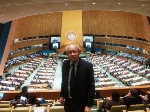Social Watch news
Published on Thu, 2015-10-15 11:22
Women for Change (WfC) would like to encourage traditional leaders to emulate Chief Mulolo of the Chewa people of Chadiza in Eastern province of Zambia by promoting positive cultural practices that protect and promote the rights of girls and women.
WfC is concerned with the continued cultural practices that perpetuate gender inequality and consequently impact negatively on the future of girls and women in Zambia.
|
Published on Thu, 2015-10-15 10:38
There has been no shortage of highly publicized scandals involving the financial sector in recent years, from the crash in 2008 onwards. A much less known, yet equally shocking, one is the key role banks play in enabling corruption, which has a devastating impact on people around the world. This is the focus of Banks and Dirty Money, a recently published report by Global Witness. It highlights how regulatory failure lies at heart of this problem too.
Corruption is “public enemy number one” in the developing world, according to Jim Yong Kim, the President of the Word Bank. In poor countries it kills people and traps millions more in poverty. When unscrupulous officials steal vast sums of state money, they decimate funds that should be spent on vital services like health care, education and infrastructure.
|
Published on Thu, 2015-10-08 19:32
The outcome reached by the international track of sustainable development objectives amounts to a dangerous twist in the concept of development, especially in terms of determining the roles of stakeholders in the development process. For example, it proposes giving the business sector the key role, being a contributor to job-generating growth. This comes before the adoption of “business-binding human rights standards.”
|
Published on Wed, 2015-10-07 09:58
In a recent report (“the report”), the UN Special Rapporteur on Human Rights and Extreme Poverty, Mr. Philip Alston (“the Rapporteur”) addressed the issue of economic inequality, drawing its connections to the enjoyment of human rights and to policy recommendations needed to tackle it. Among the recommendations offered in the report, some squarely focused on economic policies. States should “reduce inequality by adopting taxation policies that are instrumental to achieving that aim,” the report said. By linking economic inequality to human rights enjoyment and to the actions and omissions by the state (in pursuing a particular tax policy), the report constitutes yet another important building block in the emerging body of standards that connect acts and omissions of the state in the field of economic policy to human rights.
|
Published on Mon, 2015-10-05 12:33
With a "Fiesta Social" combining music, films and speeches, some twenty Belgian civil society organizations launched last October 3 a major campaign titled "Social protection for all" with the aim of defending social security as a human right in Belgium and abroad.
|
Published on Thu, 2015-10-01 08:58
Security was tight during the Papal address at the Opening Plenary of the UN Summit, so I missed these events as only a few civil society representatives could be accommodated, but certainly this was better than Addis Ababa during the 3rd Financing for Conference. The UN General Assembly formally adopted the Sustainable Development Goals (SDGs) at the opening session without further debate as the document had gone through months of debates ad revisions before Member States agreed on the final text.
|
Published on Mon, 2015-09-28 20:12
Last August 2 in New York, the United Nations agreed on the new sustainable development agenda as the guide for their global, regional and national policies over the coming fifteen years.
At the core of this new global consensus, seventeen “sustainable development goals” (SDGs) spell out a vision for a better future where poverty everywhere will be eradicated, inequalities within and between countries will be substantially reduced, and current unsustainable consumption and production patterns will be transformed.
|
Published on Mon, 2015-09-28 00:00
Last weekend a historic United Nations Summit adopted “Transforming Our World: the 2030 Agenda for Sustainable Development,” thus lifting the curtain on a new agenda for development that will replace the Millennium Development Goals (MDGs) agreed as a global agenda for the 2000 to 2015 period. The Summit convened simultaneously in New York around 170 Heads of State from around the world. This was in addition to the Pope, whose inspirational speech at the UN visibly filled out the vacuum left by today’s lack of statespersons with a global vision. The adopted document contains 17 Sustainable Development Goals (SDGs) with their 169 targets that were agreed in arduous negotiations over a process spanning over more than three years.
|
Published on Fri, 2015-09-25 15:14
The Sustainable Development Goals (SDGs) negotiated painstakingly over two years by all UN Member States with thousands of public interest organizations providing their commitment and expertise have been copyrighted. And by whom? The UN you would think? But no. They have been re-branded as Global Goals (GGs) and the copyrighted by Project Everyone, a private company incorporated and registered in London.
On its own website (www.globalgoals.org), Project Everyone claims ownership of the 17 icons that it is popularizing, with active help from celebrities and the UN Secretariat itself, representing each of the 17 Goals that the heads of State and Government are endorsing this week as common objectives of humanity from here to the year 2030.
|
Published on Fri, 2015-09-25 08:46
More than a hundred Heads of State and Government will gather in New York this week to adopt the 2030 Agenda for Sustainable Development. This agenda is intended to make the UN ‘fit for purpose’, but it is important to ask, ‘whose purpose will it be fit for’?
A new study from Global Policy Forum warns that the United Nations is embarking on a new era of selective multilateralism, shaped by intergovernmental policy impasses and a growing reliance on corporate-led solutions to global problems. The changing funding patterns of the UN and its funds, programmes and specialized agencies reflect these alarming trends. Key features are the growing gap between the scale of global problems and the (financial) capacity of the UN to solve them; the growing share of non-core contributions and earmarked trust funds in UN finance; increased reliance on the corporate sector; and the outsourcing of funding and decision-making to exclusive global partnerships.
|
SUSCRIBE TO OUR NEWSLETTER
Submit

|










